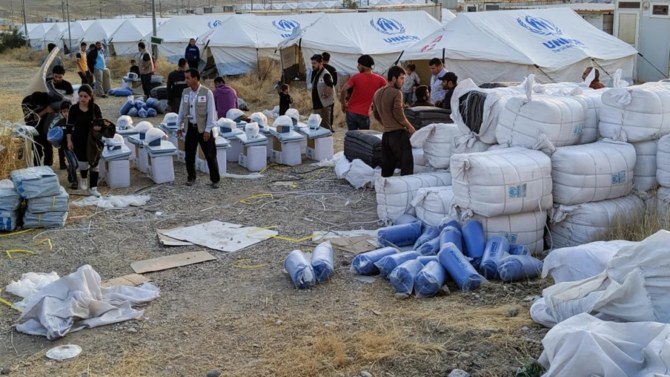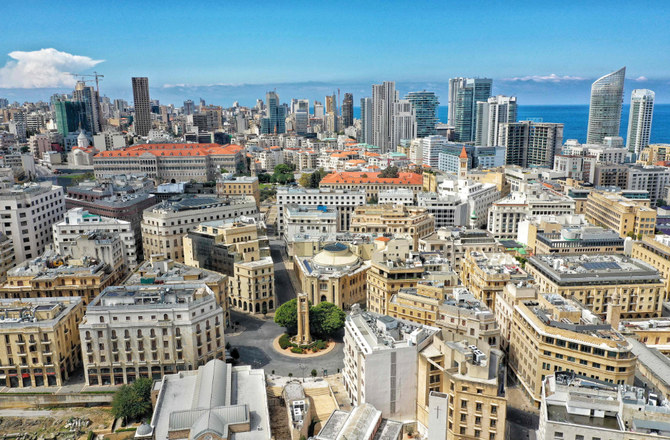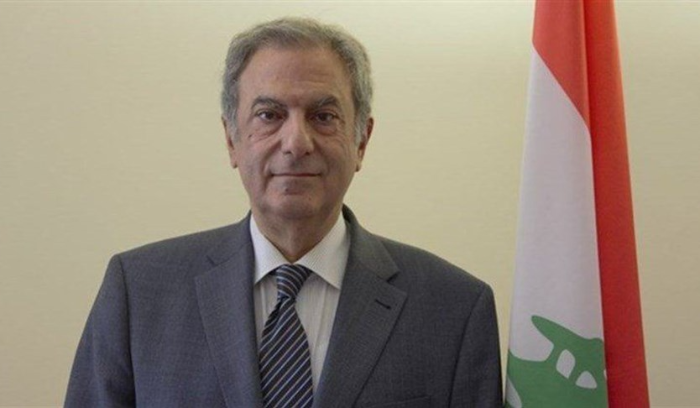
By Najia Houssari - arabnews.com -- BEIRUT: Lebanon has once again voiced its concerns about Syrian refugees, stating that the country can no longer tolerate some of their actions. Lebanese Minister of Labor Mustafa Bayram said: “Lebanon is no longer able to play policeman for other countries.” Prime Minister Najib Mikati chaired a meeting of the ministerial committee in charge of discussing the issue of Syrian refugees in Lebanon, during which Bayram said: “The Lebanese state is no longer able to handle this matter.” Bayram also stressed after the meeting that Lebanon is left alone, and the state cannot stand to cost. “We no longer have diesel boats to monitor the sea, and the UN and UNHCR must step up and bear their responsibilities. The Lebanese are queuing at banks and ATMs, while others receive direct aid in dollars. They share our water, electricity and resources while we do not get anything. Many institutions, international organizations and countries are concluding agreements with Lebanese NGOs and paying them in dollars without going through the state, and frankly, this uncontrolled situation is no longer acceptable,” he said.
Hector Hajjar, minister of social affairs, met Ayaki Ito, representative of the UNHCR office in Lebanon, and conveyed the Lebanese government’s official position regarding Syrian refugees. Hajjar’s office said he informed Ito that the Lebanese state is committed to the principle of not forcing refugees to return to their country of origin, but the situation is no longer tolerable and the state is no longer able to bear the cost of maintaining security in the refugee camps and the areas in which refugees have settled. Hajjar said: “The Lebanese state has always received less aid than the needs declared annually, despite the fact that 35 percent of the population is made up of displaced persons and refugees. According to reports, 82 percent of the Lebanese suffer from multidimensional poverty. The Lebanese state has incurred huge losses over the years, due to the displaced people benefiting from the state’s subsidies on basic commodities such as medicine, bread, and fuel, in addition to prison overcrowding and the resulting burdens, not to mention the security chaos and competition in the labor market.”

by reuters -- Leaving his office this week, the 80-year-old head of Lebanon’s election commission escorted journalists down eight flights of stairs, lighting the way with a mobile phone. As elsewhere in the country, severe power rationing meant the lift and lights were off - symptoms of an economic collapse that has pushed more than three quarters of the population into poverty.
Less than three weeks before Lebanon’s parliamentary elections, retired judge Nadim Abdelmalak is worried about what the crisis means for the fairness of the process. He said his team was understaffed to oversee voting properly, ballots could easily be bought and candidates with more means were at a huge advantage over those without. “These elections will have violations,” Abdelmalak told Reuters this week.
Lebanon’s financial meltdown has seen the lira lose 90 percent of its value since 2019 and people have been unable to access hard currency savings, hitting all sections of society. The elections will be the first opportunity since then for people to choose lawmakers, amid widespread disillusionment over political leaders and despair at what has happened to Lebanon. Some election observers are concerned that candidates would be able to secure votes by distributing food, fuel, or other basic needs that are now beyond the reach of many. “This is undoubtedly going to play a role. There are a lot of people who are going to sell their votes. These factors are going to hit the integrity and transparency of the elections,” said Abdelmalak.

وطنية - الفاتيكان - أوضح سفير لبنان لدى الكرسي الرسولي فريد الياس الخازن أن "زيارة قداسة البابا فرنسيس الى لبنان في حزيران المقبل تأتي تجسيدا لرغبة عبر عنها مرارا وفي غير مناسبة، وتلبية لدعوة وجهها إليه مجددا فخامة الرئيس العماد ميشال عون خلال زيارته الأخيرة الى الكرسي الرسولي".
ولفت في حديث الى "الوكالة الوطنية للاعلام" الى انه "كان من المتوقع ان تتم الزيارة هذه السنة، كما أشار وزير خارجية الفاتيكان المطران بول ريتشارد كالغر خلال زيارته الاخيرة الى لبنان، لكن من دون تحديد موعدها". وقال: "لقد تم الإعلان عن زيارات الحبر الاعظم الخارجية في شهر تموز المقبل الى جنوب السودان وكندا وربما الكونغو. زيارة لبنان أرادها قداسته بعد الانتخابات النيابية المقررة في 15 ايار، وفي ذلك رسالة واضحة الى أنها غير متصلة بالشأن السياسي الداخلي، وتداركا لعدم توظيف الحدث في التجاذبات السياسية المعهودة."
وأشار الى أن "الزيارة تتم في ظروف في لبنان والمحيط الاقليمي تختلف عن تلك التي سادت عندما زار البابا القديس يوحنا بولس الثاني لبنان في 1997 وأعلن الارشاد الرسولي المنبثق عن السينودس الكنسي الخاص حول لبنان، وكذلك زيارة البابا بندكتوس السادس عشر في 2012 التي تم خلالها اعلان الارشاد الرسولي حول الشرق الاوسط. وقبل عقود، كانت زيارة خاطفة للبابا القديس بولس السادس في 1964 وهو في طريقه الى الهند، آتيا من القدس".

سجعان قزي
@AzziSejean
ما شَكَّك اللبنانيّون في انتخاباتٍ نيابيّةٍ بقدْرِ ما يُشكِّكون في انتخاباتِ 15 أيّار المقبِل. أسبابُ التشكيكِ عدةٌ، أبرزُها: الارتيابُ بنيّاتِ السلطة، التخوّفُ من الوضعِ الأمنيِّ، التوجُّسُ من التدهورِ الماليّ والفوضى، وعدمُ الثقةِ بأنَّ الانتخاباتِ ستؤدّي إلى التغييرِ الإيجابيِّ المنشود.
منذ اتّفاقِ الطائف، جميعُ الاستحقاقاتِ الانتخابيّةِ مدارُ تشكيكٍ وإرجاء. النظامُ الديمقراطيُّ مُعلّقٌ بحكمِ سوءِ تطبيقِ دستورِ الطائف وسوءِ تفسيره. وفي الحالتين بحكمِ سوءِ النيّة. اسْتعيضَ عن مجلسِ الشيوخِ بمجلسِ مشايخَ مُصغّرٍ يَتحَكّمُ بالبلادِ بموازاةِ رئاسةِ الجمهوريّةِ ورئاستَي المجلسِ النيابيِّ والحكومة. واستُبدِلَت قاعدةُ الموالاةِ والمعارَضة ببِدعةِ "التوافقيّةِ" التي صَبَّت في مصلحةِ الأقوى عسكريًّا وليس في مصلحةِ الأضْعفِ ميثاقيًّا، فــثَــبَّــتَت فدراليّةً مُقنَّعةً في نظامٍ مركزيٍّ صُوَريٍّ. هذه كانت الحالُ في زمنِ النظامِ الأمنيِّ اللبنانيِّ/السوريّ، وهي مستمِرّةٌ في زمنِ النظامِ الأمنيِّ اللبنانيِّ/الإيرانيّ. البلادُ محكومةٌ من خارجِ نظامِها ودستورِها وشرعيّتِها، وخصوصًا ضِدَّ إرادةِ شعبِها. هذه انتخاباتٌ حيّةٌ في نظامٍ مَيت.
رغم ذلك، تراهنُ قوى سياسيّةٌ على الانتخاباتِ النيابيّةِ المقبِلةِ، ويُراقِبها المجتمعُ الدُوليُّ كأنَّ من صناديقِها سيُطِلُّ فجرُ لبنانَ الجديد. لكنَّ الجميعَ يَتغافلُ قصدًا أنَّ هذه الانتخاباتِ، على أهميّتِها في هذا الظرف، زُوِّرت قَبل أن تبدأَ وصارت قابلةً للطعنِ، وأنَّ نتائجَها وضيعةٌ بعدَ أن تَصدرَ. فالأكثريّةُ المنتظرةُ، أكانت لصالحِ الموالين أو المعارِضين، ستكون نسبيّةً وضئيلةَ الفارِق، وبالتالي دون القدرةِ على إجراءِ التعديلاتِ المصيريّةِ والجذريّةِ لأنَّ هذه تَتطلّبُ أكثريّةَ الثُلثين. بدأ تزويرُ الإرادةِ الشعبيّةِ والميثاقيّةِ في هذه الانتخاباتِ من خلالِ الشوائبِ التالية:
أوّلًا: نوعيّةُ قانونِ الانتخاب الذي يَصلُحُ لدولةٍ تقوم على نظامٍ حزبيٍّ حَصريّ، بينما اعتمادُه في الواقعِ السياسيِّ اللبنانيِّ يُوفّرُ الفوزَ سلفًا لقوى المنظومةِ السياسيّةِ المستهدَفةِ بمشروعِ التغيير.
Khazen History


Historical Feature:
Churches and Monasteries of the Khazen family

St. Anthony of Padua Church in Ballouneh
Mar Abda Church in Bakaatit Kanaan
Saint Michael Church in Bkaatouta
Saint Therese Church in Qolayaat
Saint Simeon Stylites (مار سمعان العامودي) Church In Ajaltoun
Virgin Mary Church (سيدة المعونات) in Sheilé
Assumption of Mary Church in Ballouneh
1 - The sword of the Maronite Prince
2 - LES KHAZEN CONSULS DE FRANCE
3 - LES MARONITES & LES KHAZEN
4 - LES MAAN & LES KHAZEN
5 - ORIGINE DE LA FAMILLE
Population Movements to Keserwan - The Khazens and The Maans
ما جاء عن الثورة في المقاطعة الكسروانية
ثورة أهالي كسروان على المشايخ الخوازنة وأسبابها
Origins of the "Prince of Maronite" Title
Growing diversity: the Khazin sheiks and the clergy in the first decades of the 18th century
Historical Members:
Barbar Beik El Khazen [English]
Patriach Toubia Kaiss El Khazen(Biography & Life Part1 Part2) (Arabic)
Patriach Youssef Dargham El Khazen (Cont'd)
Cheikh Bishara Jafal El Khazen
Patriarch Youssef Raji El Khazen
The Martyrs Cheikh Philippe & Cheikh Farid El Khazen
Cheikh Nawfal El Khazen (Consul De France)
Cheikh Hossun El Khazen (Consul De France)
Cheikh Abou-Nawfal El Khazen (Consul De France)
Cheikh Francis Abee Nader & his son Yousef
Cheikh Abou-Kanso El Khazen (Consul De France)
Cheikh Abou Nader El Khazen
Cheikh Chafic El Khazen
Cheikh Keserwan El Khazen
Cheikh Serhal El Khazen [English]
Cheikh Rafiq El Khazen [English]
Cheikh Hanna El Khazen
Cheikha Arzi El Khazen
Marie El Khazen